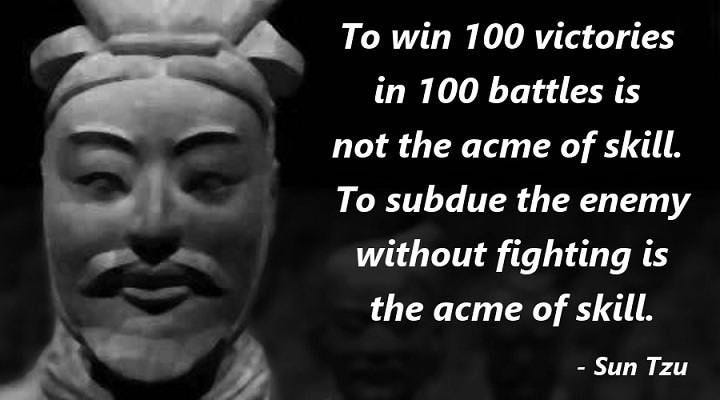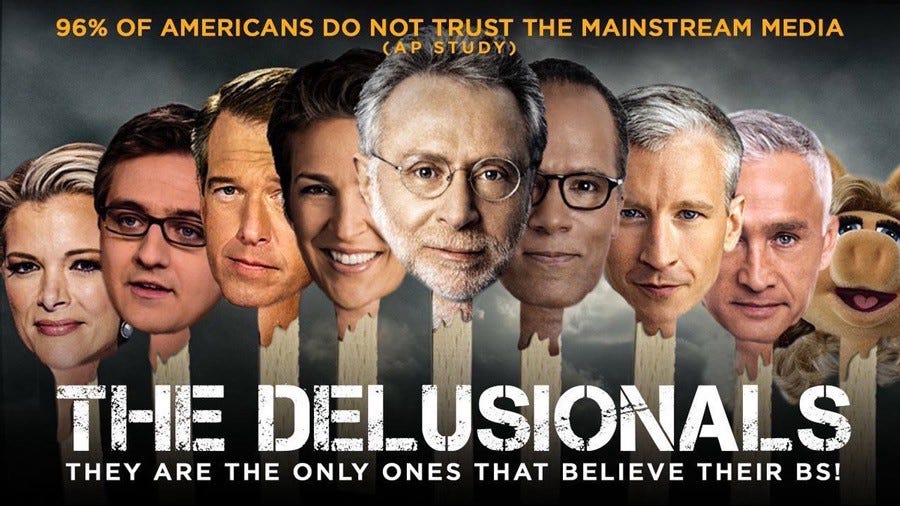Putin and the Fighter Pilot
The Tao of Vladimir Putin
In The Tao of Vladimir Putin, I connected Putin’s mindset to that of Eastern philosophy, underscoring not only his strategic genius but his commitment to principles that set him apart from Western-type politicians.
With Bucha and the missile attack on Kramatorsk, and similar recently made for TV “false flag” propaganda stories, uncritically welcomed by the Western “Media” as fact, what I have written becomes more relevantfor such fictions, like Saddam’s fake WMD hightlight the importance of integrity in war— and why you cannot lie your way to victory.
The US propaganda machine is huge, sophisticated and powerful — but it is still propaganda. And oh, “what a tangled web we weave”.
Yes, “the truth will out”. We eventually learned the truth about the Gulf of Tonkin — and about Saddam’s WMD. At some point, as with Vietnam and Iraq, there will be a lot of people denying that they were ever taken in by the stories. “I always knew that it rang false”. People who accept obvious lies, are liars themselves.
It’s like a cheating husband and the wife who says “I always knew”, after those years of accepting that the liptick stains on the collar and late night “meetings” were innocent.
Trust is what bonds us to each other in all relationships and groups, from families to neighborhoods to small companies to governments — even to empires.
Yes, some deceit is necessary as a social lubricant. “Hi, how are you?” . “Fine thank you” is OK in a cocktail party. But “I feel like shit” is better with your partner.
Propaganda, the propagation of lies, works best within a culture, exploiting close social connections based on not just the illusion of trust but the need for it. It doesn’t work so well, outside the culture, which have different belief systems. Which is why nobody much likes America except Americans. Granted— as illusions fade, a lot Americans don’t like “America” either as a country and focus more and more on the localities, which they have actual roots.
Propaganda often blares (or as they say, in Little England, “Blairs”) loudest at the end of a war, when one side has lost, as was the case with Japan in WWII, which declared it would somehow win right up until the Emperor surrendered. Now, it’s Ukraine saying it has Russia on the ropes.
For Russia the war really is over—Donbass and Lugansk and Russian Ukraine as a whole are largely secured. For the US, the war is going strong — and will continue—in its mind anyway. Then again, wars are not just physical events, military and economic — they ar also psychological and moral.
40 Second Boyd
The greatest military strategist of the 20th Century — and one of the most gifted of all time wasighter pilot John Boyd, known as 40 Second Boyd, an amazingly diverse polymath and autodidact.
Boyd had limited combat experience in Korea. Never fired his guns. Yet he revolutionized not just aerial combat but military theory — not just for military war — but as conflict theory for all areas of life.
As a fighter pilot, Boyd had a standing challenge to any and all comers that he, starting from a position of disadvantage, could win in 40 seconds. Legend has it that he never had to buy beer. It wasn’t just tactics — but strategy.
Boyd was one of those rare people with the Da Vinci trait, which I have written about on my site, www.ageingyoung.com
He taught himself higher mathematics and advanced statistical analysis, aerodynamics and design, game theory and physics while studying Sun Tzu, and a range of philosophers and military strategists. He helped invent E-M Theory, developed the concept for the most successful fighter jet in US history — -the F16 — and developed the Maneuver Combat strategy that won the First Gulf War. His revolutionary heory of the OODA loop is still taught in MBA courses as a universal theory of competition and conflict, not that anyone in the West actually understands it.
A “grateful nation” rewarded Boyd— by ignoring his accomplishments. He received no medals, no commendations. Never rose beyond Colonel and lived close to poverty. Boyd didn’t care — for him, integrity was wealth.
What is war?
Boyd took Sun Tzu’s neo-Taoist theory of war and updated it.
He defined three aspects.
Physical or military—killing people and/ or destroying their infrastructures and economies. That’s what most people raised on video games assume when they think “war”. Total destruction.
Mental war, which means altering the enemy’s perceptions of events through information and communications. Winning minds. Americans think this means propaganda — lies. But lies misfire. The truth hits the target.
Finally, “morale” or moral” war . For Americans—”demoralizing” the “enemy” means breaking down the human bonds and trust that are the glue of any group organization— again through lies. That approach is a short term tactic. Longer term, good strategy is winning trust — winning hearts— by a taking a moral position and acting on it.
As I indicated in The Tau of Vladimir Putin, Western thinking is linear, taxonomic and deductive, meaning that it moves from a theory — too often taken as an axiomatic premise or truth — to particularities, which are cherry picked as proof—a faith-based tautological approach which developed from Judeo Christian belief.
Boyd, on the other hand, ad vocated a phenomenological skepticism where premises are tested, contradictions identified and solutions innovated from the ironies of real-world engagement. Boydian strategy is therfore inductive, starting from particularity moving to conclusions that just plain work. The world is where truth resides, not the mind.
Boyd liked oriental logic because it pragmatic, focused on this world’s situations and challenges rather than on an imagined heaven; because it is a response to what-is, and what-is-not — rather than would we want-it-to-be.The West is always inside its cultural box, with a top in place. The East has boxes too but not tops and people like Boyd looked outside and beyond.
Boyd was a minimalist. When he designed the F16 (he didn’t do it himself of course) he looked to create a simple, inexpensive, highly maneuverable fighter, with not too many bells and whistles. The weapons companies of course wanted to make more money so they “added value” and turned it into a bomb truck.
In “war”, the West, or rather the USA, which controls the “West”, thinks of military power too often in terms of glitzy popular, costly symbols of strength — big aircraft carriers, hi-tech aircraft and systems, alliances and bases all over the place—regardless of whether these have specific applications or actual usefulness.
The first priority of military design is make money All very well and good for huge companies like Boeing and Raytheon — not so much for the taxpayer who has to forego things like healthcare, housing support, education and the like. Hi tech military systems are rarelyl put to the test except for bombing wedding parties and killing women and children. Like all bullies, the US avoids fair fight.
Part of this is that warfare in the Western (American) mind is not existential. Which is natural because the USA has never experienced a real war, with an enemy who could fight back on an equal basis since the Civil War. When actual damage occurs to the homeland, as with 9/11, they react with an irrational mixture of fear and anger all out of proportion to the circumstances — and misdirected as well.
Wars must be “over there” rather than “here”.
So it was that war against Hitler was “over there”, with the Russians doing most of the work. The Pacific War as “out there” in the Pacific, against an enemy, who lacked the industrial and technological capability to compete — as it itself recognized.
Ultimately, the US of A is a large island, separate from the rest of the world geographically. It’s insularity, in some ways similar to that of America’s English forebears, is psychological too. Only Americans are really human; the rest of the world are “other”.
By contrast, Eurasia is one huge land mass with crowded cultures and countries rubbing shoulders. Here, wars are existential. And, propaganda is not misunderstood as information; rather, it is symbolic—like flags or anthems, part of national mythologies.
Nobody in Russia or China reflexively believes what the government says , as Americans tend to do . They remember the USSR and Mao.
But because Putin and Xi keep their word, deliver real world benefits and continually demonstrate they care—above and beyond official rhetoric — they demonstrate personal integrity and earn the trust of peoples not predisposed to trust governments.
The Empire of Lies
While for Russians, your word is your bond, for the US, it is an just an opening gambit And there is always fine print.
No nation in history, including the Third Reich, has been so deceptive nor has broken so many agreements willy-nilly, flouting international law and the principles of justice — assuming it can control facts abroad as it controls information through propaganda and manipulation of the media.
The US always needs an enemy but it real enemy is the Truth.
Which is why the USA must try to destroy whistleblowers like Assange or Manning, or even the unfortunate computer repair guy who exposed Hunter Biden’s secrets. It is why Putin and Xi are demonized. It is why the self-proclamed Land of Liberty supports Ukrainian Nazis. It is why the American people have become one, very large, lynch mob.
The American “people” are extensions of their TVs and smartphones, conditioned by the social media and the entertainment industry to willingly suspend disbelief to accept any official narrative that fits the decor of the boxes in which they live.
Just about every TV series tends to drop in the ratings over time as people get tired of it and it seems less compelling. In this respect “the Ukraine Story” is a one season mini-series. How long its sponsors, the CIA, US State Department, and congressional parasites will support it is unsure. Its ratings are dropping. As time goes on fewer and fewer trust the media.
By contrast, the Russians have been pretty honest. Compare the briefings of the Russian MoD with what you read in the NYT and WaPo or see on the BBC. The Russians obviously don’t tell everything — but they don’t parade lies as facts, as Western media do. They are too smart for that.
Putin is in power because he keeps his word and rarely lies. He is remarkably open to his people with 5 hours, phone-in press conferences. He was trained to serve, not so much the State, but the country—and that is what he does.
His word is his bond. People trust him and his long term support is not illusory or contrived. From there point of view, he is not a politician but a leader.
Internationally, Putin does what he says he will do. And he gives lots of warning of consequences. In the run-up to the Ukraine ‘operation’ he clearly defined limits and demands, as well as legal parameters — specifying what would happen if there was no negotiation or compromise. He established a moral framework.
But Biden wanted a war. A physical conflict, which in fact, the Americans had started years earlier.
For him, words are cheap, and the truth a consumer product, churned out by a compliant media for a lazy, self-indulgent public.
40 Second Boyd always let his opponents attack from a position of advantage, and using their overconfidence to win — innovating both tactics and strategy on the fly, so he had his enemy in his sights almost immediately.
The US and the Ukraine thought they had the advantage. The Ukraine was attacking Donbass and had already won the largest part of Eastern Ukraine. Putin turned that offensive strategy to his own advantage. He had his enemy in his sights in the first week.
Then came the mental and moral war . Ukraine is finished. Ultimately, Biden is finished. The Democrats, too, if they lose congress. Beyond that ,the “United” States of America is finished, “United” not longer.






